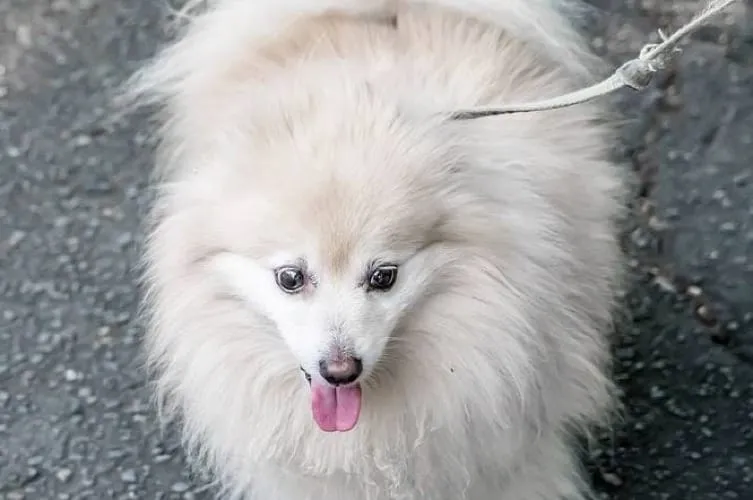Pomeranians are a popular breed of toy dogs that are known for their lively personalities and adorable looks. However, potential owners may wonder if Pomeranians are healthy dogs. The answer is not straightforward, as the health of individual Pomeranians can vary based on factors such as genetics, diet, and lifestyle.

Overall, Pomeranians are generally considered healthy dogs. They have a lifespan of around 12-16 years and are not prone to any major health issues that are specific to the breed. However, like all dogs, Pomeranians can develop health problems such as dental issues, joint problems, and obesity if they are not properly cared for. It is important for owners to provide their Pomeranians with regular veterinary check-ups, a healthy diet, and plenty of exercise to ensure their overall health and well-being.
Pomeranian Origins and Breed Information
Breed History and Pomerania
The Pomeranian breed originated in the Pomerania region of Germany and Poland, hence the name. This breed is a member of the Toy group and is known for its foxy face and small size. Pomeranians were originally bred as lap dogs and were favored by royalty, including Queen Victoria.
The Pomeranian breed was first recognized by the American Kennel Club in 1900 and quickly grew in popularity. Today, Pomeranians are one of the most popular Toy breeds in the world.
Characteristic Traits and Personality
Pomeranians are known for their intelligence, inquisitive nature, and vivacious personality. They are also known to be bossy and animated, with a cocky attitude. Despite their small size, Pomeranians are confident and make excellent watchdogs.
Pomeranians thrive on attention and affection from their owners and are known to form strong bonds with their families. They are also highly trainable and excel in obedience and agility competitions.
In summary, the Pomeranian breed is a popular and beloved Toy breed known for its intelligence, inquisitive nature, and vivacious personality. They make excellent lap dogs and watchdogs and are highly trainable.

Physical Health and Common Issues
Pomeranians are generally healthy dogs with a lifespan of 12 to 16 years. However, like all breeds, they are prone to certain health issues. In this section, we will discuss some of the most common health concerns that Pomeranians may experience.
Weight Management and Obesity
Maintaining a healthy weight is crucial for the overall well-being of Pomeranians. Obesity can lead to various health problems, such as joint problems, heart disease, and diabetes. Therefore, it is essential to monitor their weight and provide them with a healthy diet.
Dental Health and Teeth Care
Pomeranians are prone to dental problems, such as tooth decay and gum disease. It is essential to brush their teeth regularly and provide them with dental chews to prevent these issues.
Coat and Skin Conditions
Pomeranians are known for their double coat, which requires regular grooming to prevent matting and tangling. They may also experience skin conditions, such as alopecia and black skin disease, which can lead to severe hair loss. It is crucial to maintain their coat and skin health by providing them with the necessary grooming and veterinary care.
Serious Health Concerns
Pomeranians may also experience serious health concerns, such as hypothyroidism, seizures, and eye problems. They are also prone to luxating patella, tracheal collapse, and Cushing's disease. It is essential to monitor their health and seek veterinary care immediately if any symptoms of these health issues arise.
In conclusion, Pomeranians are generally healthy dogs, but they are prone to certain health issues. Maintaining their weight, dental health, coat and skin health, and monitoring for serious health concerns are crucial for their overall well-being.

Nutrition and Diet
Feeding Schedules and Portions
Pomeranians are small dogs and require smaller portions of food compared to larger breeds. A feeding schedule should be established and followed consistently to maintain a healthy weight and avoid overfeeding. It is recommended to feed adult Pomeranians twice a day, with a portion size of 1/4 to 1/2 cup of high-quality dog food per feeding. However, the exact portion size and feeding schedule may vary depending on the dog's age, activity level, and overall health.
Choosing High-Quality Dog Food
A balanced diet is essential for a Pomeranian's health. When choosing dog food, it is important to look for high-quality options that provide all the necessary nutrients. Reading the ingredients list and choosing a dog food that has real meat as the first ingredient is a good place to start. Avoid dog food that contains fillers, artificial colors, and preservatives. It is also important to choose a dog food that is appropriate for the dog's age and size.
Supplements and Special Diets
Supplements and special diets may be necessary for Pomeranians with certain health conditions or dietary restrictions. It is important to consult with a veterinarian before making any changes to a dog's diet or adding supplements. Some dogs may benefit from supplements such as fish oil or probiotics, while others may require a special diet to manage weight gain or regulate blood sugar levels. It is important to follow the veterinarian's recommendations and monitor the dog's health closely.
Grooming and Daily Care
Pomeranians are a breed that requires regular grooming and daily care to maintain their health and appearance. In this section, we will discuss the three main aspects of grooming and daily care: brushing and coat maintenance, bathing and cleaning, and exercise and activity levels.
Brushing and Coat Maintenance
Pomeranians have a thick double coat that requires regular brushing to prevent matting and tangling. Brushing should be done at least once a week with a slicker brush or a comb. It is important to start brushing your Pomeranian at a young age to get them used to the process.
In addition to brushing, Pomeranians should also have their coat trimmed regularly. This helps to prevent matting and keeps their coat looking neat and tidy. It is recommended to have a professional groomer trim your Pomeranian's coat every 6-8 weeks.
Bathing and Cleaning
Pomeranians do not require frequent bathing as it can strip their coat of natural oils, leading to dry skin. However, they should be bathed every 3-4 months or when they become dirty or smelly. When bathing your Pomeranian, it is important to use a mild shampoo specifically designed for dogs.
In addition to bathing, Pomeranians should also have their ears cleaned regularly to prevent infection. This can be done with a cotton ball and a gentle ear cleaning solution.
Exercise and Activity Levels
Pomeranians are an active breed and require daily exercise to maintain their health. They enjoy walks, playtime, and interactive toys. It is important to provide them with enough exercise to prevent obesity and other health issues.
In addition to exercise, Pomeranians should also be provided with mental stimulation to prevent boredom. This can be done through training, puzzle toys, and interactive play.
Overall, grooming and daily care are important aspects of owning a Pomeranian. With proper care and attention, your Pomeranian can live a happy and healthy life.

Behavior and Training
Socialization and Interaction
Pomeranians are social dogs that love to interact with humans and other animals. Proper socialization is necessary to ensure that the dog is comfortable around people and other pets. Early socialization with other dogs, cats, and people can help prevent aggression and shyness in Pomeranians.
It is recommended that Pomeranians be introduced to a variety of people, animals, and environments during their first few months of life. This can help them become well-adjusted and confident adults. Owners should also encourage positive interactions with other dogs and people to ensure that their Pomeranian is comfortable in social situations.
Training Techniques and Challenges
Pomeranians are intelligent dogs that are eager to please their owners. However, they can be stubborn and difficult to train at times. Positive reinforcement techniques, such as praise and treats, can be effective in training Pomeranians.
Owners should also be patient and consistent when training their Pomeranian. It is important to keep training sessions short and frequent, as Pomeranians have a short attention span. Owners should also be aware that Pomeranians can be prone to barking, and should be trained to control their barking behavior.
Male Pomeranians can be more difficult to train than females, as they tend to have more energy and can be more stubborn. However, with consistent training and positive reinforcement, male Pomeranians can be well-behaved and obedient pets.
Pomeranians have a thick coat that requires frequent grooming, which can be a challenge for some owners. Regular grooming sessions can help prevent matting and tangles in their coat, and can also help keep their coat healthy and shiny.
Overall, Pomeranians are healthy and well-behaved dogs that make great pets for families and individuals alike. With proper socialization and training, Pomeranians can be well-adjusted and obedient pets that bring joy to their owners.

Preventive Health Measures
Pomeranians are generally healthy dogs, but like all living beings, they are prone to certain health issues. To ensure that your Pomeranian stays healthy, it is important to take preventive measures. Here are some important preventive health measures for Pomeranians:
Regular Veterinary Check-Ups
Regular veterinary check-ups are essential for the overall health of your Pomeranian. A veterinarian can identify any health issues early on and provide appropriate treatment. During a check-up, a veterinarian will examine your Pomeranian's eyes, ears, teeth, nose, heart, lungs, and other vital organs. They may also recommend blood tests and other diagnostic procedures to identify any underlying health issues.
Vaccinations and Parasite Control
Vaccinations and parasite control are important preventive measures for Pomeranians. Pomeranians should receive vaccinations against common canine diseases such as distemper, parvovirus, and rabies. Additionally, Pomeranians are susceptible to fleas, ticks, and other parasites, so it is important to use appropriate parasite control measures such as flea and tick prevention medications.
Recognizing Early Symptoms
It is important to recognize early symptoms of health issues in Pomeranians. Some common health issues in Pomeranians include hypoglycemia (low blood sugar), coughing, and dental problems. If you notice any symptoms such as lethargy, loss of appetite, vomiting, diarrhea, or any other unusual behavior, it is important to consult a veterinarian immediately.
Proper care and preventive measures can help ensure that your Pomeranian stays healthy and happy. Regular veterinary check-ups, vaccinations, parasite control, and recognizing early symptoms are important steps in keeping your Pomeranian healthy.
Breeding and Adoption

Choosing a Responsible Breeder
When looking for a Pomeranian puppy, it is important to find a responsible breeder who prioritizes the health and well-being of their dogs. A good breeder will provide you with health clearances for both parents, as well as information on the puppy's vaccination and deworming history. They should also be willing to show you the living conditions of their dogs and answer any questions you may have about the breed.
It is recommended to avoid purchasing Pomeranian puppies from pet stores or online marketplaces, as these sources often obtain their puppies from puppy mills or irresponsible breeders who prioritize profit over the health of their dogs.
Adoption and Rescue Options
Adopting a Pomeranian from a rescue organization can be a great option for those who want to give a loving home to a dog in need. Many rescue organizations specialize in Pomeranians and other toy breeds, and can provide you with information on the dog's health and temperament.
In addition to breed-specific rescues, there are also many general dog rescues that may have Pomeranians available for adoption. It is important to ask questions and do your research before adopting to ensure that the dog is a good fit for your lifestyle and home environment.
Overall, whether you choose to purchase from a responsible breeder or adopt from a rescue organization, it is important to prioritize the health and well-being of the Pomeranian. This friendly and affectionate companion deserves a loving and caring home.
Conclusion:
In conclusion, Pomeranians are a delightful and popular toy breed, cherished for their intelligence, spirited personality, and endearing appearance. They generally enjoy good health, with a lifespan of 12 to 16 years, provided they receive proper care, including regular veterinary check-ups, a nutritious diet, and sufficient exercise. While they are predisposed to certain health issues such as dental problems, coat and skin conditions, and some more serious concerns, many of these can be managed or mitigated with attentive care and preventive measures.
The breed's origins in the Pomerania region, its rich history, and its evolution into a beloved companion underscore its enduring appeal. The characteristic traits of Pomeranians, including their vivacity and loyalty, make them excellent companions and family pets. Their grooming needs, dietary requirements, and exercise and socialization needs are important considerations for prospective owners to ensure these dogs lead fulfilling lives.
Adopting a Pomeranian, whether through purchase from a responsible breeder or rescue organizations, entails a commitment to their health, well-being, and happiness. Potential owners should be prepared for the responsibilities of Pomeranian care, embracing the joys and challenges alike. By providing love, proper care, and attention, owners can ensure their Pomeranian companions thrive, bringing joy and affection into their lives for many years.
FAQs
- What is the average lifespan of a Pomeranian?
- Pomeranians typically live between 12 to 16 years. Their lifespan can be influenced by their overall health, care, diet, and lifestyle.
- Are Pomeranians prone to any specific health issues?
- While Pomeranians are generally healthy, they can be susceptible to dental problems, obesity, joint issues, coat and skin conditions, and some breed-specific concerns like hypothyroidism, luxating patella, and tracheal collapse.
- How often should I groom my Pomeranian?
- Pomeranians have a thick double coat that requires regular brushing at least once a week to prevent matting and tangling. Professional grooming every 6-8 weeks is also recommended to keep their coat in good condition.
- What kind of diet is best for a Pomeranian?
- A balanced diet with high-quality dog food that includes real meat as the first ingredient is recommended. Portion control is important to prevent obesity, with adult Pomeranians typically requiring 1/4 to 1/2 cup of food per feeding, twice a day.
- How much exercise does a Pomeranian need?
- Pomeranians are active and need daily exercise to maintain their health. This includes walks, playtime, and interactive toys. Mental stimulation is also important to prevent boredom.
- Is it better to buy a Pomeranian from a breeder or adopt?
- Both options have their benefits. Purchasing from a responsible breeder ensures you know the puppy's background and health history. Adopting from a rescue organization gives a dog in need a home and can also be a rewarding experience. It's important to prioritize the health and well-being of the Pomeranian in either case.
- Can Pomeranians be trained easily?
- Pomeranians are intelligent and eager to please, making them relatively trainable with patience and consistency. Positive reinforcement techniques work well. However, they can be stubborn, so short, engaging training sessions are recommended.




